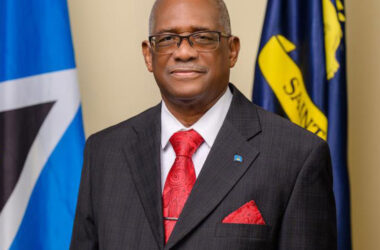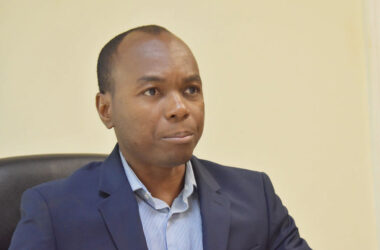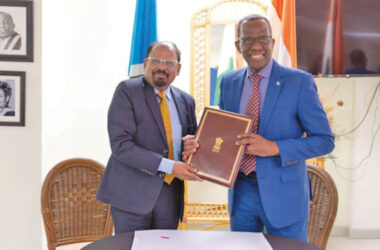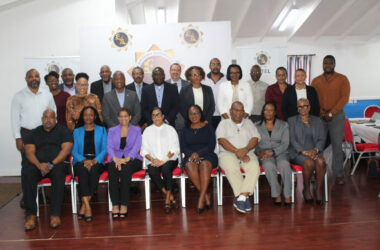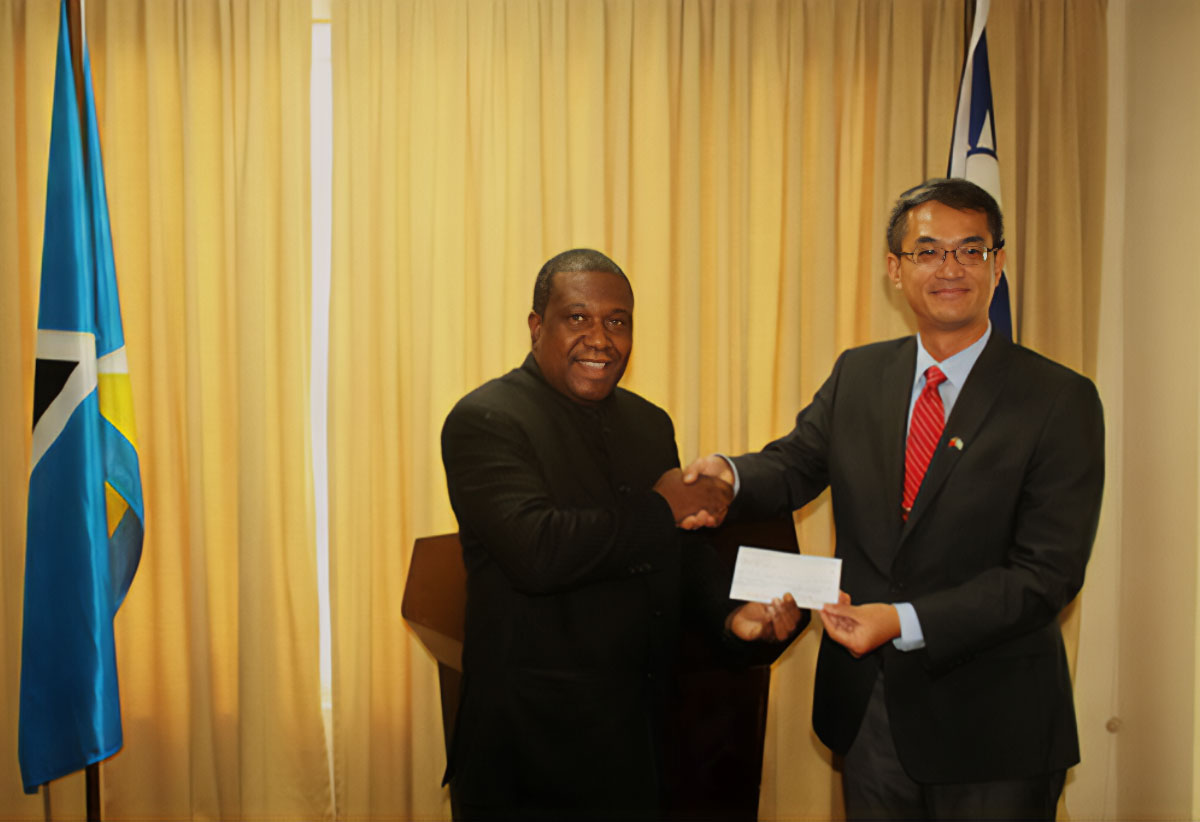
(RODNEY BAY, Gros Islet, Saint Lucia – Tuesday, November 8, 2022) – His Excellency Peter Chia-yen Chen, Taiwan’s Ambassador to Saint Lucia, recently handed over a cheque for US$80,000.00 to Hon. Alva Baptiste, Minister for External Affairs, International Trade, Civil Aviation & Diaspora Affairs, to finance the “Eastern Caribbean Solar Challenge: Race to the Sun” Initiative.
The official handover of an initial US$80,000.00 of the total sum of US$200,000.00 was done on Thursday, November 3, 2022, at the Ministry of External Affairs, International Trade, Civil Aviation & Diaspora Affairs, at Baywalk Mall, Rodney Bay. This amount will go towards promoting the use of solar power in Saint Lucia’s public sector.
Launched in 2021 by Saint Lucia and the Organization of Eastern Caribbean States (OECS), the “Eastern Caribbean Solar Challenge: Race to the Sun” is a bold and exciting new renewable energy initiative that aims to engage governments, the private sector, development partners, impact financiers, and households in a united effort to increase the diffusion of solar energy across the region by the end of 2023, in the first instance. The current revised target is 6.5 MW of new solar through small and medium distributed solar installations across the OECS by 2025.
Speaking at the handover ceremony, Ambassador Chen said Taiwan recognizes the joint initiative of the Caribbean Nationally Determined Contribution Finance Initiative (NDCFI) by the OECS and the Government of Saint Lucia, and the Race to the Sun Initiative. He said Taiwan is pleased to support such initiatives.
“Taiwan is firmly committed to combatting climate change and doing its best to assist our diplomatic allies in attaining the goal of net-zero emissions by 2050 set by the Paris Agreement,” Ambassador Chen said.
Ambassador Chen added that: “We are willing to make contributions to the Race to the Sun Initiative, and the Government of the Republic of China (Taiwan) has agreed to sponsor US$200,000.00 to the Race to the Sun Initiative. On Monday (November 7), US$80,000.00 will be used exclusively in Saint Lucia to promote solar power, especially in the public sector.”
Ambassador Chen thanked Prime Minister Hon. Philip J. Pierre, Hon. Alva Baptiste, and Hon. Shawn Edward, Minister for Education, Sustainable Development, Innovation, Science, Technology and Vocational Training, and other Government officials for supporting Taiwan’s participation at the United Nations Framework Convention on Climate Change (UNFCCC).
“With Taiwan’s professional, pragmatic and constructive participation in the UNFCCC, the Paris Agreement and associate mechanisms, I believe Taiwan can contribute even more to Saint Lucia, to the Caribbean Region, and to the world,” Ambassador Chen said.
In his remarks, Hon. Alva Baptiste said the Government of Saint Lucia will continue to interact with the Government of Taiwan because both countries are focused on common objectives of humanity.
“I am very appreciative (and) my staff and my Ministry, the Government of the Philip J. Pierre administration that I belong to, actually recognize true friendship, and we’re highly appreciated of contributions toward the sustainable development of this country,” Hon. Baptiste stated.
He added that: “Climate change continues its decimating march across the moral, social, economic and environmental fabric of our countries. The unfortunate thing is that we have been graduated from receiving concessionary financing because they say we are middle-income countries. So we face erosion of trade preferences, we face decline in official development assistance, and now climate change. The net effect is to create massive problems in our respective economies.”
Hon. Baptiste explained that given the harsh conditions that are placed on Saint Lucia and other small islands developing states in relation to climate change, any genuine assistance from friendly countries are welcome. He noted that Taiwan has been at the forefront of that development assistance.
Meanwhile, Chamberlain Emmanuel, Head of the Environmental Sustainability Cluster, OECS, noted that the developing small island states have long recognized their inherent vulnerabilities as it relates to climate change. Recent events have included the effects of the pandemic, geopolitical instability and other issues have exacerbated these challenges, he added.
“Our region, like the rest of the planet, is in dire need of energy and climate solution that provide multiple benefits to help underpin our long–term sustainable development strategies and contribute to our near-term recovery efforts,” said Emmanuel.
Emmanuel said a significant part of the region’s gross domestic product (GDP) is spent on imported fossil fuel, with the resulting high and variable cost of energy being a major hurdle for competitiveness, particularly in the tourism and manufacturing sectors, thereby stymieing overall economic growth and development.
“Achieving an increased level of energy independence, diversification of our energy sources, and reduction of energy prices will further provide a positive domino effect that will ultimately improve the overall quality of life in our region and support our resilience goals,” Emmanuel said.
Emmanuel said that to date, the region has only developed a fraction of its indigenous energy resources, adding that the transition should include healthy balance and use of mature and proven technologies, and modern and innovative approaches that will redound to ease in implementation, affordability, social acceptance, and quick returns on investment.
“Solar energy fits the bill for all these criteria, and our geographic location makes the use of solar energy technology an obvious choice for all Members of the OECS,” Emmanuel stated, as he thanked Taiwan for its assistance. “Furthermore, solar energy has the potential for widest application and adoption across sectors and at various levels of society. It can help meet the growing demand of energy while diversifying the energy generation mix to facilitate development.”





